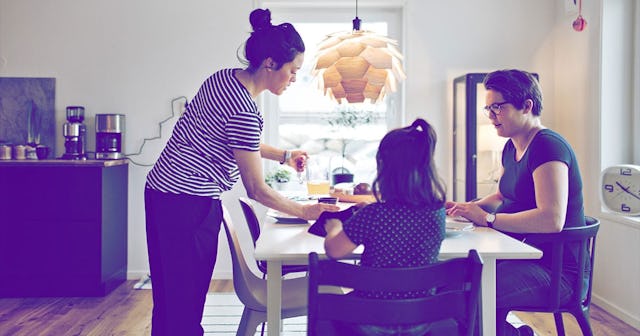6 Tips For Talking About Sexuality With Your Kids

Sexuality is a topic that can bring up a lot of feelings for people, especially when thinking about sexuality in regards to your own children or students. To clarify, the word “sexuality” refers to a person’s reproductive health and genitals, gender identity, sexual orientation, relationships, body image and love. Additional intersections of identity may also make talking about sexuality harder for caregivers. Families of children with disabilities may have additional challenges when addressing sexuality — from lack of sexuality education for people with disabilities, to antiquated beliefs around sexuality for people with disabilities.
Your own sexuality education experience may have been problematic, creating a sense of anxiety around addressing the topic of sexuality. Here are some tips that may help you feel more comfortable talking about sexuality with the people in your life.
1. Use and teach correct terms for body parts.
An elbow is an elbow. A penis is a penis. A nose is a nose. A vulva is a vulva. When people know the correct terms for their body parts, they are able to have more autonomy over their bodies. It is much easier for people to report any unwanted touch if they know and understand what their body parts are called and their function.
2. My body belongs to me.
People of all ages need to know that their body belongs to them and only them. There might be situations — like going to the doctor or having someone help with toileting — where for health and safety reasons a professional will have to touch you. Those professionals should ask and explain what they are doing and why.
3. Answer questions honestly.
Adults often worry that if they answer one question about sexuality their child/student will want to keep asking more complex questions. Most often if you answer a question as simply and straightforward as possible that will satisfy the person’s curiosity. If you don’t know the answer to a question, say you don’t know and then find out the answer. It is better for people to learn the answers to questions around sexuality from a trusted adult than the internet.
4. Talk to your children/students about sexuality.
There is a general concern about teaching too much information to our children before they are ready. Additionally, some adults are scared that if they talk about sexuality, their children will have more sex. In fact, studies have shown that people with comprehensive sexuality education have delayed initial sexual experiences and more skills to navigate relationships. Young children don’t know yet that sexuality can be an uncomfortable or taboo subject for many people. As adults in their lives, we set the tone for how they feel about their sexuality, their ability to express themselves and stay safe.
5. Sexuality can be an exciting part of your life.
Sexuality doesn’t need to be serious all the time. Sexuality education isn’t just about abuse prevention and navigating difficult relationships (although both are important). Helping people celebrate who they are and how they identify can be joyful. Sex can be fun and pleasurable when it happens in a safe and healthy way. Relationships can be hard but also wonderful. Learning to express your gender or sexual identity can be uplifting and empowering.
6. No one is perfect.
Talking about sexuality can be awkward. Even for people who teach sexuality education for a living, there are times when we say things or share ideas that feel uncomfortable. Don’t be afraid to name that feeling. Letting people know that we all make mistakes and that sexuality education is a lifelong process will help them feel safer learning from their own mistakes.
For more information follow us on:
https://www.facebook.com/SFAAbilities